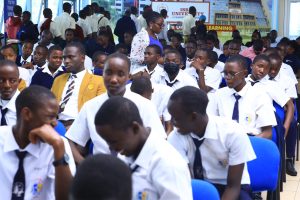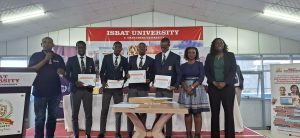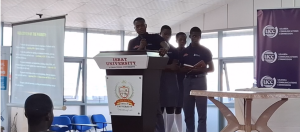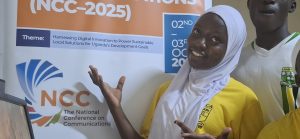St. Joseph Kinaaba Community Secondary School ICT Club Launch Kanungu
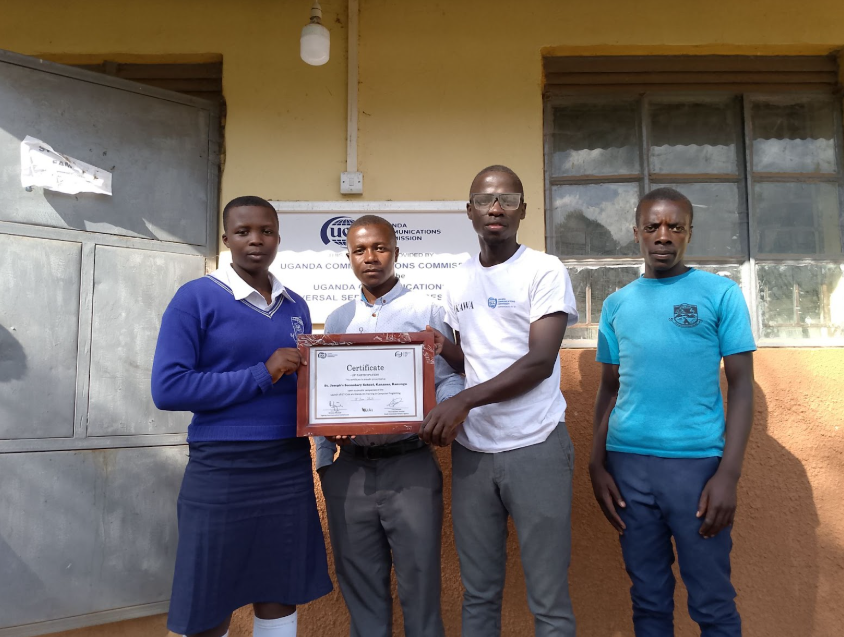
On June 12, 2025, St. Joseph Kinaaba Community Secondary School in Kanungu District took a monumental step toward bridging the digital divide by officially launching its ICT Club. This significant initiative was made possible through the dedicated support of the Uganda Communications Commission (UCC) and the Kisubi Associated Writers’ Agency (KAWA). The launch is an integral part of a national program strategically designed to transform secondary schools across Uganda into vibrant hubs of digital innovation, fostering creativity and equipping students with essential 21st-century learning skills. The event itself served as a dynamic platform, introducing students to project-based ICT learning, a wealth of offline digital content, and powerful software development tools that are meticulously aligned with Uganda’s Competency-Based Curriculum. The day’s activities were expertly facilitated by Mr. Noah Okwalinga, a National ICT Trainer with KAWA, and meticulously coordinated by the school’s highly dedicated ICT patron, Mr. Birungi Eliab. The training and launch were successfully held at the school’s premises, marked by enthusiastic participation from both students and staff members alike.
A total of 60 students, primarily from Senior Two (S.2) and Senior Three (S.3), actively engaged in the intensive sessions. While the initial number of participants was modest, the learners exhibited remarkable enthusiasm, profound curiosity, and unwavering determination to explore the fascinating world of technology. The club also demonstrated a commitment to inclusivity, with a gender representation of 28 male students and 22 female students, indicating a positive step towards digital equity in the region. The session was meticulously structured to be both highly informative and intensely practical, ensuring students received a thorough orientation. This included detailed discussions on the purpose, clear goals, and operational structure of the newly formed ICT Club. Students were also comprehensively introduced to the invaluable role of KAWA CONNECT offline resources, which encompass a rich array of interactive digital video lessons, activity-based eBooks and modules, and engaging educational simulations. The practical aspect of the training featured crucial hands-on sessions where students were guided through installing and effectively using Visual Studio Code for basic programming, designing intuitive mobile applications using MIT App Inventor, and engaging with Scratch programming for beginners—a visually intuitive coding platform that effectively introduces fundamental logic and sequencing skills. Despite the notable absence of a projector, a challenge that could have hindered group learning, the facilitators brilliantly adapted, ensuring students followed closely and participated actively in group discussions and direct demonstrations on individual laptops, maximizing the available resources.
However, the lack of a projector did present a significant challenge, limiting the ability to display visual aids effectively and to fully deliver the Executive Director’s important recorded message to all students simultaneously. Nevertheless, the facilitators commendably adapted, providing direct demonstrations and clear explanations on individual machines to ensure learning continuity. To ensure the ICT Club not only thrives but also reaches its full potential, several key recommendations were put forth. Firstly, there is a clear and urgent need for the provision of additional equipment, including more laptops, routers, and crucially, a projector, to significantly enhance learning capabilities and ensure every student has ample access to hands-on experience. Secondly, ongoing mentorship is vital; continuous support through virtual follow-up sessions from KAWA and UCC will be instrumental in reinforcing skills and sustaining learner engagement over time. Lastly, the newly established ICT Club should implement a robust system for activity reporting, initiating monthly progress reports that meticulously capture all conducted activities, encountered challenges, student innovations, and specific areas requiring further support, ensuring accountability and continuous improvement.
Looking ahead, the ICT Club at St. Joseph Kinaaba Community Secondary School is now officially active and poised for significant impact. Though starting with modest numbers, the remarkable dedication shown by both students and teachers promises strong and positive outcomes in the months to come. With the right mentorship and enhanced infrastructure, the club is set to become a vital launchpad for digital transformation within the community, enabling learners to build impactful applications, solve real-world problems, and confidently explore emerging technologies. As Mr. Okwalinga, the day’s facilitator, aptly remarked, “This ICT Club is not just about learning computers—it is about preparing students to think critically, create solutions, and participate actively in Uganda’s digital future.”
Special acknowledgements are extended to the school administration, led by Headteacher Mr. Baseinah Tumuhimbise (0788032959), for providing excellent support and unwavering commitment throughout the entire process. Mr. Birungi Eliab, the dedicated patron, demonstrated exceptional leadership in mobilizing and guiding the learners with great enthusiasm. Profound gratitude is also extended to UCC and KAWA for their visionary leadership and consistent investment in ICT for education. Their collaborative efforts are instrumental in helping schools like St. Joseph Kinaaba transform into dynamic centers of digital innovation and vast opportunity for young Ugandans. For further information or to offer support to the club, please contact Patron Mr. Birungi Eliab at 0760149526 or Facilitator Noah Okwalinga through KAWA Uganda.




